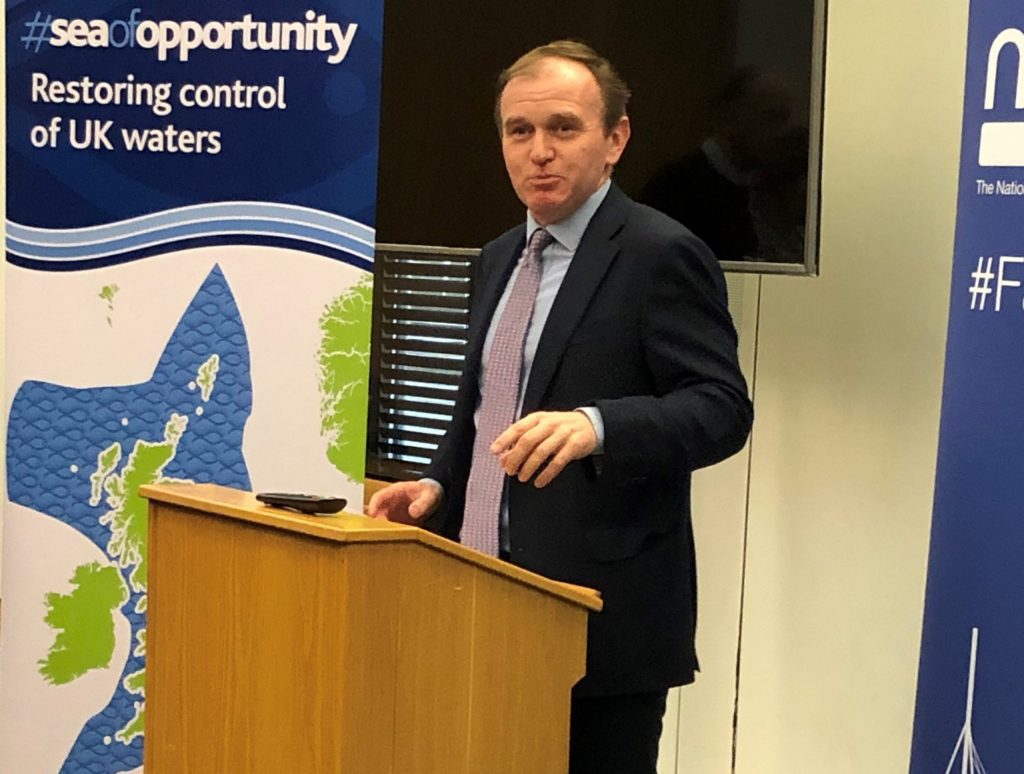An “incredible level of support” for the fishing industry, was expressed at an event in Westminster organised jointly by the National Federation of Fishermen’s Organisations and the Scottish Fishermen’s Federation. The event, which was held within the Palace of Westminster attracted support from over 100 parliamentarians, MPs and lords, across the political spectrum. It took place two days before the UK leaves the EU, on the day which the Fisheries Bill received its first reading, and ahead of critical negotiations on future fisheries arrangements between the UK and EU. These are expected to begin in February or March.
There was also a huge level of media interest in the event from national, international and local news outlets. After speeches from UK Fisheries Minister George Eustice, as well as shadow spokespeople from the main opposition parties, teams of federation representatives from specific ports and regions engaged in briefing individual parliamentarians and journalists. Westminster studios were also fully occupied in interviews and examination of the fishing industry’s case, as the new era dawns.
The federations’ central message was that the UK’s departure from the EU provides the opportunity to break with the Common fisheries policy. Under international law, the UK will now carry the rights and responsibilities of an independent coastal state. Access for non-UK vessels to fish in UK waters, which currently catch more than 60% of the resources in UK waters, will cease to be automatic and will be negotiated on a bilateral basis. The Government has made clear that access will only be granted for a rebalancing of the asymmetric and antiquated quota shares which have pertained since 1983.
NFFO Chief Executive, Barrie Deas, said:
“The level of support expressed for the fishing industry in Parliament yesterday was incredible and reflects a widespread determination to establish the UK as a genuine independent coastal state in act as well as in law.”
“The model to which we aspire is already in existence and has been in existence for 40 years. It is the current fisheries relationship between the EU Norway – another independent coastal state and third country.”
The annual reciprocal fisheries agreement between EU and Norway:
- Sets total allowable catches on the basis of scientific advice
- Agrees quota shares on the basis of the resources in each respective zone (zonal attachment)
- Agrees access arrangements to fish in each other’s waters
- Agrees quota exchanges, where these are mutually beneficial
Barrie Deas added, “The key to the EU/Norway agreement lies in three important words: annual, balanced and reciprocal. It is an agreement which respects the regulatory autonomy of each party in their own respective exclusive economic zone and negotiates arrangements which are of mutual benefit. The annual cycle for the negotiations provides an agile and adaptive framework capable of dealing with the dynamic character of the stocks and the fishing industry itself. This is what we want for the UK”
Fisheries Bill
With a majority of 80, the government is unlikely to face major problems as the Fisheries Bill passes through its parliamentary stages. Although amendments may provide some improvements, there is little prospect that its main provisions will be derailed.
The most important of these:
- Give powers to UK ministers to manage fisheries in the UK’s EEZ after the UK leaves the EU and after any transition period
- Provides scope for ministers to amend fisheries law, initially retained from the Common Fisheries Policy to prevent any legal gap
- Sets an important range of objectives, including a new one on climate change
- Introduces the concept of statutory management plans which will balance the (sometimes conflicting) objectives in a way that makes sense in specific fisheries
- Recognises the relevance of the devolution settlement
The Bill is an important and necessary step towards managing our fisheries in ways that can bring real advantages to our coastal communities.

